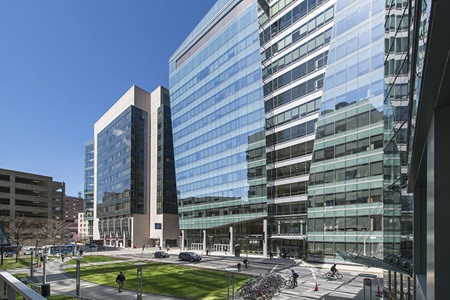Phase 3 Trial Finds Oral Empagliflozin Provided Safe Glycemic Control in Children with Type 2 Diabetes
One of the Largest Studies of Young People With Type 2 Diabetes to Date, Dinamo Provides Important Insight Amid Rise of Childhood Overweight and Obesity Leading to Type 2 Diabetes in Adolescents
BOSTON – Type 2 diabetes is a chronic disease in which the body does not produce enough of the hormone that regulates blood sugar, called insulin, while cells in the muscle, fat and digestive system simultaneously become less sensitive to it, absorbing less sugar from the blood stream. The condition results in high blood sugar levels, which over time can cause damage to the heart, nerves, eyes, and kidneys, as well as delay wound healing and diminish cognitive function. Controlling blood sugar, or glycemic levels, through medication is critical to staving off these many complications.
Researchers led by pediatric endocrinologists at Joslin Diabetes Center recently completed a phase 3 clinical trial that assessed the efficacy and safety of two different classes of oral agents for the treatment of type 2 diabetes in young people aged 10-17 years. One of the largest studies of children and adolescents with type 2 diabetes to date, the trial demonstrated that one of the two anti-diabetic therapeutics – both of which have already been proven safe and efficacious in adults – provided clinically meaningful and statistically significant improvements in glycemic control in young people, while the other did not. The findings, which appeared in The Lancet Diabetes & Endocrinology, represent a new treatment option for young people with type 2 diabetes and also underscore the differences in disease progression between young people and adults with type 2 diabetes.
“Type 2 diabetes was once called ‘adult-onset diabetes,’ but it is increasingly common among children – likely linked to the dramatic upsurge in global childhood overweight and obesity – and unfortunately, youth-onset type 2 diabetes carries extraordinary high risk of complications during early adulthood,” said first author Lori M. Laffel, MD, MPH, chief of the Pediatric, Adolescent, and Young Adult Section and head of the Section on Clinical, Behavioral, and Outcomes Research at Joslin. “Over the past few decades, many new therapeutic agents across different drug classes have been approved for use in adults with type 2 diabetes; by contrast, there is a paucity of treatments for type 2 diabetes in young people.”
As part of the DIabetes study of liNAglipton and eMpagliflozin in children and adOlescents, or DINAMO, Laffel and colleagues assessed the efficacy and safety of empagliflozin and linagliptin – two well-studied oral agents with demonstrated safety and efficacy in adults with type 2 diabetes – in children and adolescents with type 2 diabetes. Between April 2018 and May 2022, Laffel and colleagues enrolled 262 and randomized 158 participants aged 10 to 17 with type 2 diabetes in this double-blind, placebo-controlled trial, uniquely comparing two agents with a single placebo group. The participants were followed at 108 sites in 15 countries.
The 158 participants were randomly assigned to receive one of three regimens; 52 participants to empagliflozin, 53 to linagliptin and 53 to placebo once daily for 26 weeks to assess efficacy and safety. After 26 weeks, double-blinding remained and participants on active treatment continued their medication while participants on placebo were randomly assigned to empagliflozin or linagliptin for further assessment of safety up to week 52.
In the empagliflozin group, researchers determined that participants’ hemoglobin A1C (HbA1C) levels, a measure of average blood sugar levels over the past two to three months, decreased by week four and remained below that of the placebo group at week 26, demonstrating an improvement in diabetes control with an adjusted mean difference in HbA1c of 0.84% favoring empagliflozin compared with placebo. In the linagliptin group, the scientists found an initial decrease in HbA1C at week four, followed by an increase toward baseline values at week 26, which was similar to that seen in the placebo group. Similarly, when the researchers looked at participants’ fasting plasma glucose, they saw larger effects in the empagliflozin group versus the placebo group. The safety profiles of both empagliflozin and linagliptin matched that seen in studies of adults with type 2 diabetes.
“Our findings show that an empagliflozin dosing regimen provides a clinically relevant and statistically significant reduction in HbA1C in young people with type 2 diabetes, whereas linagliptin did not,” said Laffel, who is also a professor of pediatrics at Harvard Medical School. “The results of this trial support the management of type 2 diabetes in young people with empagliflozin for safe and effective lowering of HbA1C early in the course of the disease. Given the recognized challenges of treating type 2 diabetes in young people, and the likely need for combination phamacotherapy to achieve target glycemic control aimed at preventing complications and preserving health, oral administration of empagliflozin along with injectable insulin might offer a promising approach to care.”
Co-authors included Thomas Danne, MD, of Auf der Bult Kinder-und Jugendkrankenhaus; Georgeanna J. Klingensmith, MD, of University of Colorado; Willian V. Tamborlane, MD, of Yale University; Steven Willi, MD, of Perelman School of Medicine at the University of Pennsylvania and Children’s Hospital of Philidelphia; Philip Zeitler, MD, of Children’s Hospital Colorado; Dietmar Neubacher of Boehringer Ingelheim; and Jan Marquard, MD, of Boehringer Ingelheim Pharmaceuticals. Elvira Isganaitis. MD. MPH, at Joslin was also an investigator in this study.
This work was funded by the Boehringer Ingelheim and Eli Lilly and Company Alliance.
About Joslin Diabetes Center
Joslin Diabetes Center is world-renowned for its deep expertise in diabetes treatment and research. Part of Beth Israel Lahey Health, Joslin is dedicated to finding a cure for diabetes and ensuring that people with diabetes live long, healthy lives. We develop and disseminate innovative patient therapies and scientific discoveries throughout the world. Joslin is affiliated with Harvard Medical School and one of only 18 NIH-designated Diabetes Research Centers in the United States.



